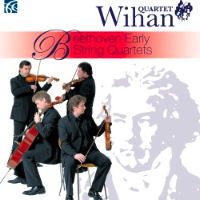
Perfection of Ensemble
Beethoven's early
string quartets -
heard by
ROBERT ANDERSON'... no excuse for the near-supersonic velocity ...'
|

|
It was wise of the Wihan Quartet to issue their recording of the Late Quartets first. There is no escaping the power and complexity of that incomparable music, and at moments of doubt I felt the need to invoke the highest divine authorities to arbitrate on matters of tempo. Here it is very different. Winter in the Convent of St Agnes may be decidedly parky, but there is no excuse for the near-supersonic velocity of the faster movements in these six works. The result is that, with one exception, where Beethoven's vision is searching far into the future, I have chosen as music examples nothing more frisky than Andante scherzoso.
What is to be done? Should players be made to study Beethoven's sketchbooks, so as to comprehend the vast labour and mental concentration that went to the making of this music? Should they be dismissed to some cave, such as was discovered by the Seven Sleepers of Ephesus, and abandon in deep slumber of a century or two the false standards of the present age? Do not misunderstand me. The perfection of ensemble and technical accomplishment are above praise; but they signify so little.
Beethoven's first slow movement in Op 18 is an elegy of extraordinary intensity. It may have been inspired by Shakespeare's Romeo and Juliet or been wrung from him in the agonising consciousness of approaching deafness. No team could totally ignore its sombre import, nor does the Wihan Quartet. Even so the melodic lines need a more searing Innigkeit. But the quietly pulsating accompaniments are done with the requisite tenderness, and the movement is a highspot of the set.
Listen -- Beethoven: Adagio affetuoso ed appassionato (Op 18 No 1)
(CD1 track 2, 0:00-1:39) © 2009 Wyastone Estate Ltd
The playful elegance in the opening Allegro of the G major quartet eludes the team, but it is impossible to resist that moment in the development where Beethoven deploys all his contrapuntal art in a passage that presages the profoundest moments in the Ninth Symphony.
Listen -- Beethoven: Allegro (Op 18 No 2)
(CD1 track 5, 4:00-5:22) © 2009 Wyastone Estate Ltd
Of course Beethoven is heir to Mozart and Haydn, but as he became ever more excluded from the outer world, his spirit developed an increasingly striking individuality, of which there are wonderful pre-echoes in Op 18.
Neither the D major nor C minor quartet has a slow movement to approach that in the First Quartet; but the Andante con moto of No 3 has an airy resilience that Beethoven could command as late as the 'metronome' movement in Symphony No 8.
Listen -- Beethoven: Andante con moto (Op 18 No 3)
(CD1 track 10, 0:00-1:43) © 2009 Wyastone Estate Ltd
Beethoven in C minor always means business of high import, in this case mainly in the outer movements, where the Wihan players are too fast both for comfort and also sympathetic playing of the multiple-stranded chords. The 'Scherzo' is a safer bet.
Listen -- Beethoven: Scherzo. Andante scherzoso quasi Allegretto (Op 18 No 4)
(CD2 track 2, 0:00-1:37) © 2009 Wyastone Estate Ltd
The A major quartet is the most Mozartian of the set; here again the players show no feeling for the date at which the work was written. Once more a section of the gentle variation movement must do duty for the whole.
Listen -- Beethoven: Andante cantabile (Op 18 No 5)
(CD2 track 7, 5:16-6:29) © 2009 Wyastone Estate Ltd
In the last quartet Beethoven writes a slow movement that approaches the intensity of his first effort.
Listen -- Beethoven: Adagio ma non troppo (Op 18 No 6)
(CD2 track 10, 0:00-1:28) © 2009 Wyastone Estate Ltd
And then there is the mysterious 'Malincolia' to come. Nothing can detract from the significance of the Wihan's having given the first ever complete Beethoven quartet cycle in Prague. Next time round they must forget Macbeth and his 'twere well it were done quickly'.
Copyright © 12 September 2009
Robert Anderson,
Cairo, Egypt
 CD INFORMATION: BEETHOVEN EARLY STRING QUARTETS
CD INFORMATION: BEETHOVEN EARLY STRING QUARTETS
| 
